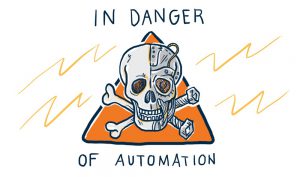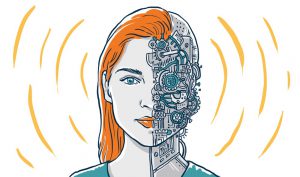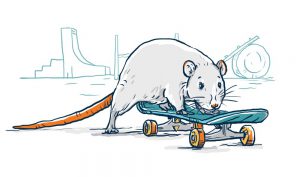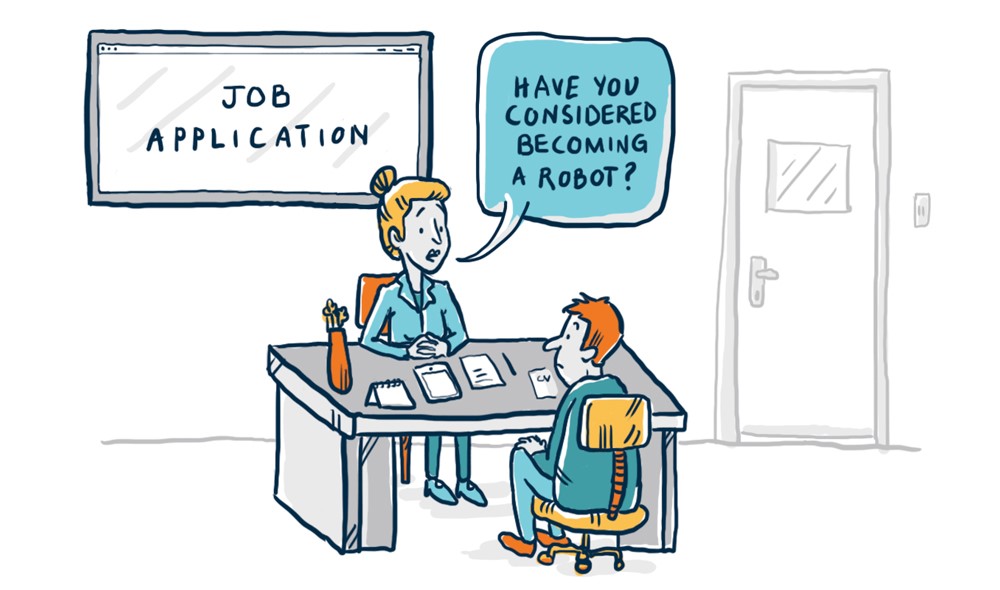Will you lose your job to a robot?
Fast forward 10 years into the future. It’s 2026 and a whole spate of new graduates are taking their first tentative steps into the working world. A world that looks completely different to the one we know today, with career opportunities and job titles that we’ve never even heard of.

Will your dream job still exist in 10 years?  65 percent of current students will end up in jobs that have not even been invented yet. This also means that people already employed in jobs need to start thinking about how they are going to make a living in the next 10 to 20 years.
65 percent of current students will end up in jobs that have not even been invented yet. This also means that people already employed in jobs need to start thinking about how they are going to make a living in the next 10 to 20 years.
There is no doubt that some of the most powerful 21st century technologies like robotics and artificial intelligence, which are able to perform high-level, cognitively complicated tasks, may render certain jobs obsolete. Replacing human workers with technology is simply more productive and efficient.
 Is your job on the ‘endangered species list’?
Is your job on the ‘endangered species list’?
Many service industry roles are predicted to disappear in the future, among the most popular are: Cashier, Telemarketer, Bank teller, Travel agent, Postal worker, Librarian.
Preparing yourself for the future world of work
With many of today’s jobs beginning to lose relevance in a world increasingly dominated by new technologies, the challenge facing anyone at the beginning of their career is studying something that will match the demand for jobs of the future, while developing the skills necessary to succeed in the modern workplace.
However, it’s not all bad news, and it’s important to remember that the fourth industrial revolution is not going to be possible without the human minds that set it in motion in the first place.
Analysts predict that there will be a surge in job opportunities for software developers, data analysts and digital architects, as well as jobs that require creativity, ingenuity and innovative thinking.
In a story for Slate Magazine, Microsoft CEO Satya Nadella said, “It’s not going to be about human vs. machine. We humans have creativity, empathy, emotion, physicality, and insight that can then be mixed with powerful A.I. computation—the ability to reason over large amounts of data and do pattern recognition more quickly—to help move society forward.”
then be mixed with powerful A.I. computation—the ability to reason over large amounts of data and do pattern recognition more quickly—to help move society forward.”
Therefore, jobs that are either highly creative professions that can’t be automated, or professions in computer, science and mathematical related fields as well as architecture and engineering, which combine art and science, are the most likely to grow.
Futurologist Thomas Frey agrees and predicts that the most in demand jobs will involve software and app development, gamification experts and virtual reality designers. In addition to the expected, here are some we’ve never heard of before, according Thomas Frey’s predictions:
 Diversity designer - as the world becomes more connected, the ability to build and lead diverse teams will be critical in any sector.
Diversity designer - as the world becomes more connected, the ability to build and lead diverse teams will be critical in any sector.- University founders – those who can provide a world-class, entrepreneurial, and free education will be in huge demand.
- Nutrient banker – will use tools to measure nutrients in soil, food, and in our bodies, maximising production of healthy foods and enabling consumers to make better choices.
- Rat trainer – rats are the world’s best solution for detecting unexploded ordinance, and diseases.
So the question remains, if you are about to leave school and begin a university degree or embark on a new career path, what should you do to give yourself the best chance of gaining meaningful employment now and in the future?
Develop the right skills for the job
According to Mark Chaban, director of Education for Microsoft Middle East & Africa, there are five essential skills you should develop to be successful in the modern workplace - the five Cs:  communication, collaboration, critical thinking, creativity and computational learning.
communication, collaboration, critical thinking, creativity and computational learning.
“You need to focus on problem solving and a certain way of thinking and operating, rather than only developing technical skills such as mastering a specific coding language or software. With technology advancing so quickly, it’s vital that young people learn to be agile and embrace change. These skills are essential for work in the 21st century and need to be instilled in young people at school level,” he adds.
“Humans need not apply”
The best piece of advice for future job-seekers is to stay away from jobs that are in danger of becoming obsolete.
In addition, Nadella also asserts that there are certain “musts” humans need to remain relevant—particularly when it comes to thinking clearly about the skills future generations must prioritize. In order to make it in the future world of work students will need:
- Empathy - Empathy is so difficult to replicate in machines. It will be valuable in the human–A.I. world. Perceiving others’ thoughts and feelings, collaborating and building relationships will be critical.
- Education - We will need increased investment in education to attain higher level thinking and develop the knowledge and skills needed to implement new technologies on a large scale.
- Creativity - Creativity is one of the most coveted human skills. Machines will continue to enrich and augment our creativity.
- Judgment and accountability - We may be willing to accept a computer-generated diagnosis or legal decision, but we will still expect a human to be ultimately accountable for the outcomes.
 Be future-ready, be flexible
Be future-ready, be flexible
Of course nobody can predict the future, the best approach would be to constantly stay abreast of new developments by upskilling yourself to remain relevant, being flexible and adaptable to change, and staying away from jobs and industries that are in danger of becoming null and void as a result of technology.
We rode the wave of the past three revolutions, we can certainly conquer the fourth.
Comments
- Anonymous
September 02, 2016
it was informative Thankyou blogger - Anonymous
September 02, 2016
nice one, thanks.
